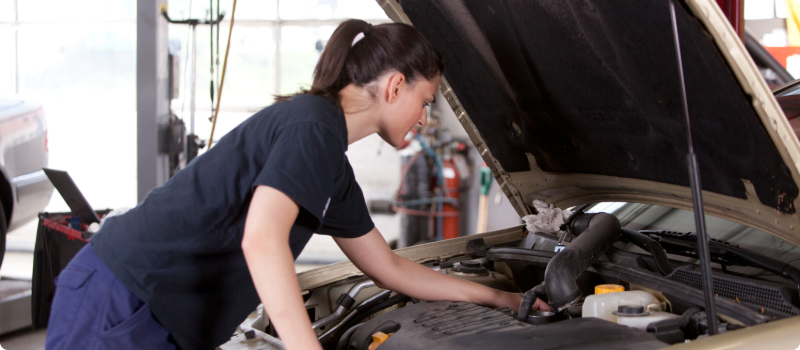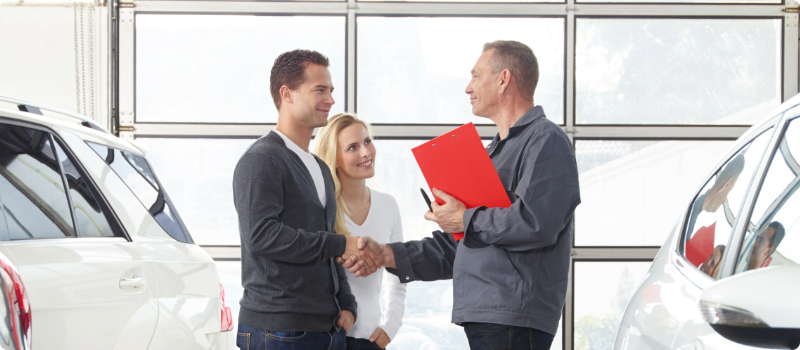
How to Buy a Car Out of State
Updated December 1, 2020 . AmFam Team
Buying a car out of state is much easier than it used to be thanks to online auto dealers. Whether you’re buying a used or brand-new car, you may have discovered out-of-state dealerships offering discounts or incentives not available locally.
You may also be able to find the make, model, color or options package you want when they're not available nearby. And used car buyers will love the wide variety of vehicles available that they can’t find in their own state. As the internet continues to even the playing field on purchasing a car, either in person or virtually, it's just smart to explore how to buy a car out of state. You could save a ton of money and find something you'll really love driving. But can you avoid paying sales tax on a car out of state? Let's find out.



Should I buy a car out of state?
Buying a car out of state can seem like a good idea, because many wrongly assume they're able to save on sales taxes when buying in a state that doesn’t charge sales taxes. Not to rain on that parade, but auto sales tax is typically paid on the purchase of a vehicle in the state where the vehicle will be registered — not where it’s purchased. If you’re wondering “should I buy a car out of state and save on taxes?” The answer is: you might not save much.
Budget for Paying Sales Taxes
If you’re going to be shipping the car to your home state after making the purchase, much of that tax-free savings can be offset by the transferring fees. You may need to buy a temporary registration tag from the purchase state if you’re planning on driving it back. And you'll likely not be off the hook for tax payments when your register the new vehicle in your home state.

Review Smog Testing Requirements Where You're Buying
Some states will not allow the sale of a car that did not pass a smog test. Even if you make a purchase from a private seller, if the car's failed it's emissions test, then you may be required to make adjustments and get the car re-certified. Because purchasing used vehicles are generally understood to be an "as is" purchase, it will be up to the buyer to ensure EPA compliance.
Check Both DMVs
Be sure to check in with your home state’s DMV before committing to an out-of-state automobile purchase to better understand your local tax burden after purchasing. To avoid any unpleasant surprises, it’s best to do your homework and contact the other state’s DMV so you’ll know how you’ll be required to pay taxes, title fees, etc., after buying a new car out of state.

Get the Car in Front of a Mechanic Before Making an Offer
When making an out-of-state car purchase, be sure to get on the calendar of a nearby and well-reviewed mechanic. This is key for high mileage vehicles that no longer have an active warranty. Ask the mechanic about the physical condition of the car and what repairs or maintenance costs to expect. Then base your offer to purchase on those findings. The small upfront cost for the technician’s time could save you thousands down the road.

Buying a New or Used Car Out of State
As far as car insurance is concerned, you’ll likely be able to transfer your current auto policy to the new vehicle when buying a new car out of state. But because values between vehicles can vary, it’s best to revisit your auto policy, even if you’re buying a used car out of state. Here are a few other things to think about when making a purchase on a car elsewhere:
Out of State Car Purchase Coverage Options
Between gap/lease & loan coverage and comprehensive coverage options, it pays off to have the right policy in place before you take ownership of the car. In many cases, when your vehicle’s financed, certain coverage can be required by your lender.
Explore Municipal and County Fees
Other financial issues can arise when purchasing new or used vehicles out of state, like the impact that local and county taxes where you're buying the car can have on your bottom line. Even purchasing from a private seller can require you to pay out to all local entities when the time comes to purchase temporary vehicle plates.

Requirements for Buying a Car Out of State
Out-of-state car shopping definitely involves extra preparation and greater due diligence. Here’s a handy checklist that’ll help you get into that sweet set of wheels you’ve been dreaming of:
Title and Registration for Out of State Cars
With a new car, the dealership will handle the title and registration paperwork for you in the state of purchase and will mail the title to your state depending on how your state handles titles. But after that, you’ll have to title and register it in your home state.
If you’re buying a used car from a private seller out of state, there may be some extra paperwork necessary depending on the states involved. Again, it's best to contact DMVs in both states to see what steps you need to take when buying an out-of-state vehicle privately.

Smog, Emissions and Safety Inspections
Some states require EPA inspections and may have certain requirements and restrictions that others don’t. If the car is not compliant, be prepared to take steps and pay additional costs to get it certified.
Don't Let Sales Taxes and Fees Surprise You
It’s important to keep in mind that you’ll need to pay sales tax in the state where your car will be registered (your home state) — not in the state where it was purchased. A dealership may handle it for you, but they don’t have to. So, do yourself a favor by making sure your state’s sales tax is properly paid, so you don’t have any hiccups when you register it at home.

Car Insurance Should Be Purchased Before You Buy a Car Out of State
Contact your insurance agent before you make the purchase, so you have your auto insurance ready to go. This can speed up the process and gives you the protection you want for your new ride.
It’s important to know you’ve got the right coverage before you hit the road. Be sure to check out our state vehicle coverages index where you can learn about policy requirements where you live.
Buying a car out of state may require some additional work but is it also a great way to find the best vehicle for your needs. The last step when buying an out-of-state car? Take that car out on the open road and enjoy the ride!
This information does not, and is not intended to, constitute legal or financial advice. You should contact a professional for advice specific to your situation.
This information represents only a brief description of coverages, is not part of your policy, and is not a promise or guarantee of coverage. If there is any conflict between this information and your policy, the provisions of the policy will prevail. Insurance policy terms and conditions may apply. Exclusions may apply to policies, endorsements, or riders. Coverage may vary by state and may be subject to change. Some products are not available in every state. Please read your policy and contact your agent for assistance.
*Customers who bundle home and auto insurance policies may save up to 23% on both policies together (as of December 2023). Discounts may vary by state, property, policy form and company underwriting the home and/or auto policy. Discounts may not apply to all coverages on a home or auto policy.

